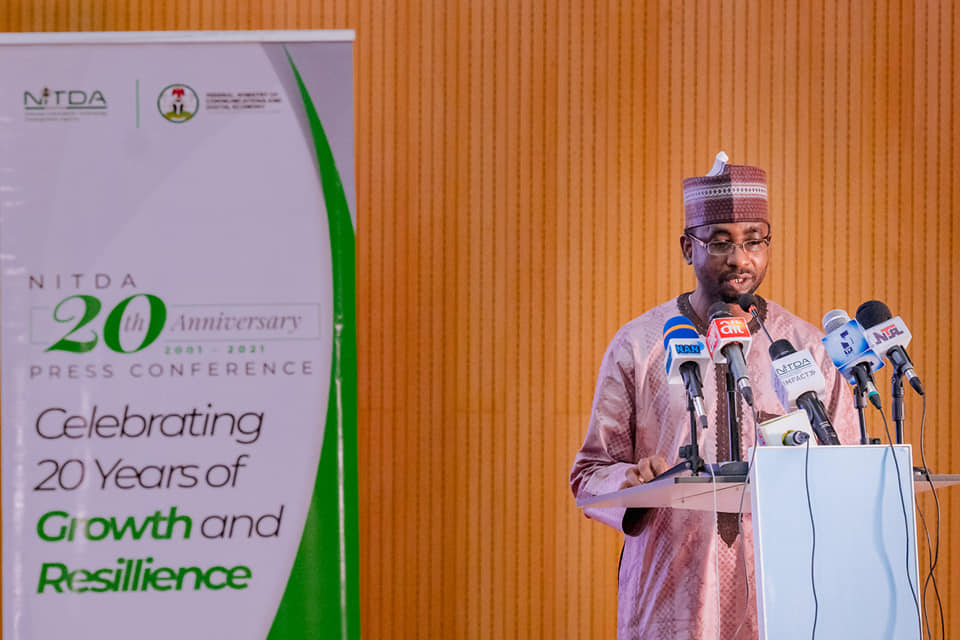By Nwakaego Alajemba
Director General/CEO, National Information Technology Development Agency (NITDA), Mallam Kashifu Inuwa Abdullahi, has announced plans for a new strategic direction as the agency turns 20.
Abdullahi, while speaking during the NITDA @20 Anniversary Conference today in Abuja hinted at a new strategic roadmap to be launched next week that will set the tone for IT regulation and development within the context of the National Digital Economy Policy and Strategy for a Digital Nigeria (NDEPS) unveiled in 2019 by President Muhammadu Buhari. The NDEPS replaced the National IT Policy which guided NITDA’s policy thrust from birth.
“Today, we celebrate what we have accomplished in 20 years, but next week, we will unveil our new strategy to raise the bar a little higher to help us do more before our silver jubilee anniversary,” said Abdullahi.
Adding: “You may also be aware that the National Digital Economy Policy and Strategy for a Digital Nigeria (NDEPS) replaced the National IT Policy. Therefore, with the expiration of NITDA’s Strategic Roadmap 2017 – 2020, we have developed a new Strategic Roadmap in line with NDEPS, which will be unveiled next week.”
Noting that NITDA’s evolution has not been without challenges, the NITDA’s boss said the agency has recorded remarkable successes.
His words: “With this important milestone in carrying out our mandates, we think our 20th-anniversary worth celebrating. Since its establishment, NITDA has evolved in many aspects and responded to its mandates’ dynamics. You may be aware that the agency’s mandates are to achieve three broad objectives mainly. To provide advisory services, regulate and develop the Information Technology Sector
“The story of NITDA explains Nigeria’s journey to a digital economy. The journey is slow but quintessential evolution into a Digital Nigeria despite the many daunting challenges we face.”
Speaking further, he said: “There is no doubt that there are a lot of achievements recorded by the Agency since its establishment. These achievements include huge ICT contribution to GDP from less than 0.5% in 2001 to more than 14% in 2020, catalysing job creation and igniting innovative activities in the tech ecosystem.
“Likewise, we have achieved a lot in digital inclusion and literacy. As a result, now we are witnessing the emergence of new economic sectors like Fintech, eCommerce, Venture Capital investment, Business Process Outsourcing, Data Protection Compliance Organisations, IT equipment manufacturing, and robust software industry.”
NITDA was established 18th of April 2001, following the Federal Executive Council’s approval of the National Information Technology Policy in March 2001. Consequently, the National Assembly passed into law the NITDA Act, 2007, which mandates the agency to regulate, develop, and advise on IT practices in Nigeria.
Since its establishment, the agency has helped to provide regulatory and development frameworks for different subsectors in a way that has impacted tremendously across industry verticals.
“Ever since, NITDA has been working assiduously to help Nigeria catch the train of the 4th industrial revolution without leaving any sector of the economy behind. The Agency has played critical roles in national development by providing the legal framework for information technology development, pioneering IT developmental projects, facilitating access to information technology goods and services, catalysing job creation and ensuring national security,” said Abdullahi.
He added: “I am happy to say that NITDA has substantially actualised the National IT Policy’s goal to digitise Nigeria and the Agency is now in the phase of digitalising the country. What is the difference between digitisation and digitalisation? Digitisation means using IT to enhance traditional processes. In comparison, digitalisation means using IT to deliver new value propositions through innovation. It is about taking advantage of IT as a source of inspiration and strategic national economic, security and social platform.”
NITDA has fostered data industry
One of the subsectors that the agency has helped to nurtured is data privacy to position Nigeria to be able to participate effectively in the global data industry, stressed the NITDA’s CEO.
“Similarly, with the release of the Nigeria Data Protection Regulation (NDPR), NITDA has created a new industry, stimulated new business models, and empowered thousands of Nigerians through capacity building and skills development. We licensed 72 Data Protection Compliance Organizations (DPCOs), created over 2,686 new jobs roles in the industry, developed a new data protection sector valued at around 2.2 billion Naira.
“The agency has also successfully investigated and issued data breach fines to many organisations, including public institution. More importantly, other countries are looking up to the Agency for guidance on Data Protection Regulation.”


































